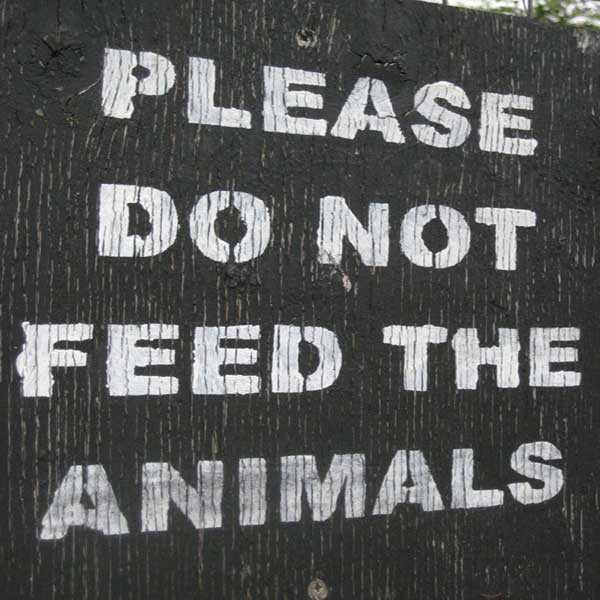Petting Zoos: How Teaching Children the Wrong Message is Big Business
Disclosure: This post may contain affiliate links
Petting zoos are just one example of how we teach children the wrong message. We don't mean to; of course we want to do right by our kids. But corporate culture - the machine of modern society - it must continue. It must profit. And in one way or another, we are all victims.

What's in this post
By Daria Zeoli, Guest Contributor
Flyers that had been posted for this event advertised pony rides and a petting zoo… fun for the kids! And on this morning, which was gray and chilly – the sun wouldn’t come out until later – a couple of miniature donkeys and a few goats stood in their pen, waiting to be fed by unassuming children and their well-meaning parents, who would be asked to buy a cup of feed for a mere five dollars.
A couple of years ago, I spent a weekend in Lancaster, Pennsylvania. The hotel had a petting zoo on the premises:
I watched my friends feed seemingly starving goats and sheep and I say this because I saw one goat literally tackle another to the ground making his way to an outstretched hand.
I can still recall clearly how my friends scolded the goat, as if it were his fault that he was in this situation. I thought back to him as I watched the animals at the street fair, and wondered how they had gotten there that morning – where they lived, how they were treated, what would happen to them when the petting zoo didn’t need them anymore.
According to the Animal Rights Coalition:
“Petting zoo operators perpetually breed or purchase animals so that they will have an endless supply of “cute babies” to draw crowds. These babies are prematurely removed from their mothers, denying them the natural socialization process needed for normal development and then these frightened, helpless babies are hauled all over the place for our entertainment. Older animals are simply disposed of when they have exhausted their usefulness.”
If you’re surprised by this, I understand. I would never have thought to consider the fates of a baby goat or his mother in my pre-vegan days. It’s not something that would necessarily cross the mind of the general public – certainly not as children, who are the target of such attractions, and not as adults – parents or other caregivers – who might hold fond memories of their own petting zoo experiences from when they were kids.
And after all, carnivals, state fairs, and street fairs already exploit animals in other ways that we’ve been conditioned not to question – by selling their body parts as food in the form of burgers, sandwiches, bird legs on a stick, and endless other examples of the gluttonous nature of the modern outing.
It’s a strange thing, the compartmentalization that we humans are so good at. We don’t see the sadness, the violence in our food. And we see our ability to ride ponies and feed domesticated animals as an opportunity. Children naturally have a curiosity about – and perhaps even an affinity towards – animals. Petting zoos capitalize on this – it’s big business for them, especially if they’re getting five bucks for a cup of feed. Consider, for a moment, that the non-human animals behind the fence aren’t the only ones being exploited in this situation.
We are exploiting the innocence, the openness of children by teaching them from a young age that animals don’t have their own interests at heart – that they are here to be fed from our hands, to allow us to sit on their backs, to “give us” their milk and eggs, to “give us” their lives because we “need to” eat meat. Do you remember how young you were when you were indoctrinated into this belief system? I don’t remember when I was; it was always there. It was there when they served us little cartons of cow’s milk with our school lunch, when they advertised dyes filled with artificial food coloring to color chicken’s eggs for Easter, when they brought a porcupine to my grammar school class and took a photo of me petting it for the local newspaper. It was there in every school trip to the zoo, in every pair of leather sneakers my mother bought me for the new school year, in every trip to whichever fast food chain had the most tantalizing toy in their kid’s meal.
Petting zoos are just one example of how we teach children the wrong message. We don’t mean to; of course we want to do right by our kids. But corporate culture – the machine of modern society – it must continue. It must profit. And in one way or another, we are all victims.
Photo: davesanford






When I was a kid I used to love petting zoos, never even once thinking beyond the moment, considering how these animals came to be there or where they would eventually go, or linking the fact that many of these animals I was cooing over were the same animals that I would be eating later that day. It is such a huge disconnect that we are encouraging in young people, though I guess a lot of adults have that same disconnect as well.
That’s right, Susan – if we disconnect as children and are never given an opportunity to, we won’t plug in as adults, either. Here’s to advocating and educating so that more people are given that opportunity.
Daria.. great perspective!
Like good soldiers of modern, corporate, capitalistic society.. we HAVE been conditioned not to question, as our innocence HAS been exploited. Greed, envy and entitlement have hardened our naturally compassionate soul.. darkening our bright love for all species. Our innocence virtually lost as a culture. BBQ’s, Drive-Thru’s and Supermarket Morgues viewed as our human privilege.. exploiting the creatures of this earth which cannot advocate for themselves. These innocent souls live their current lifetime in a body that isn’t respected by those having dominion over them. Shameful.. just shameful.
When I stop to think how blatantly obvious the mistreatment is of animals, and how unjust are the exploitations of their basic rights.. as if their happiness and freedom were of no greater value than the broom we use to sweep the floor, the stuff we throw in our trash-cans or the waste which swirls down our toilets, this “accepted” world of abuse reveals itself. As Vegans, we consciously return to innocence.. being lighthouses for the most compassionate form of human expression.. “Do No Harm”.
Namaste
From one lighthouse to another, shine on, Tommy. And thank you as always for reading and for the thoughtful comments!